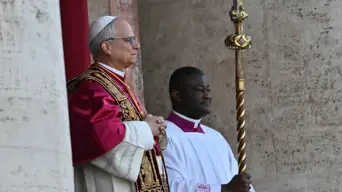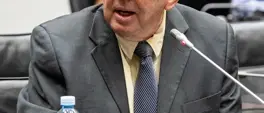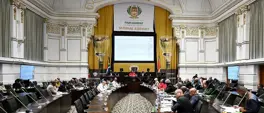First Chinese bishop appointed under Pope Leo XIV
AFP
11 June 2025 | 16:40The Vatican and China's Communist leadership do not have formal diplomatic relations, as the Holy See recognises Taiwan while Beijing claims the self-ruled island as its own territory.

FILE: Newly elected Pope Robert Francis Prevost, Pope Leo XIV, (L) arrives on the main central loggia balcony of the St Peter's Basilica for the first time, after the cardinals ended the conclave, in The Vatican, on 8 May 2025. Picture: Andrej ISAKOVIC/AFP
VATICAN CITY - The Vatican announced Wednesday the first appointment of a Chinese bishop under Leo XIV, signalling the new pope's support for a controversial accord on nominations struck by his predecessor with Beijing.
The Holy See expressed "satisfaction" at the recognition by China of the appointment of Joseph Lin Yuntuan as auxiliary bishop of Fuzhou, capital of the southeastern Fujian province. The pope made the nomination on June 5.
"This event represents further fruit of the dialogue between the Holy See and the Chinese authorities and is an important step in the communal journey of the diocese," it said in a statement.
The Vatican and China's Communist leadership do not have formal diplomatic relations, as the Holy See recognises Taiwan while Beijing claims the self-ruled island as its own territory.
But in a historic deal, they agreed in 2018 to allow both sides a say in the naming of bishops in China, which has about 12 million Catholics.
The deal -- whose text has never been made public -- has drawn criticism within the Church, with some seeing it as allowing the Communist government a stranglehold over the country's Catholics.
READ: Pope Leo condemns 'exclusionary mindset' in Pentecost address
Yet as Pope Francis sought to make inroads for the Church in China, the deal was renewed several times, most recently in October 2024, for four years.
Francis died on April 21 after 12 years as head of the world's 1.4 billion Catholics, and Leo was elected in a conclave of cardinals on May 8.
Between the death of one pope and the naming of another, Beijing proceeded with the "election" of two bishops in the dioceses of Shanghai and Xinxiang.
Commentators have viewed that move as an attempt by the Chinese Communist Party to take advantage of the institutional vacuum in the Vatican to assert its authority over the Church in China.
Get the whole picture 💡
Take a look at the topic timeline for all related articles.
















